Bank robberies and fraud cases are increasing across Syria, compounding the troubles of a country ravaged by months of brutality and war.
Two foreign-backed lenders have already alerted the country's stock exchange about major robberies in separate filings.
Syria International Islamic Bank, the largest shareholder of which is Qatar International Islamic Bank, said it had been targeted in a robbery in Homs resulting in the loss of 75.2 million Syrian pounds (Dh4.12m). The bank had notified the authorities as well as its insurer, it said in a filing to the Damascus Securities Exchange.
"Unfortunately, these incidents are happening more and more frequently in the 'hot spots' of Syria," said Anas Jawish, the listing and operations director at the Damascus Securities Exchange.
"This is the fear. For Syria International Islamic Bank, which made 200m pounds in profit last year, its not easy when you lose 75m in a robbery."
Local insurance companies in Syria that have re-insurance agreements abroad will be able to reimburse the banks, Mr Jawish said.
It is unclear if the robbery was politically motivated. The lender has been under sanctions since June after the United States accused it of being a vital conduit to the Bashar Al Assad regime's alleged efforts to obtain weapons of mass destruction.
Banque Bemo Saudi Fransi, backed by Saudi Arabia's fourth-largest lender by market capitalisation, said it had incurred losses from fraud and forgery totalling 25m pounds in a separate filing.
Standard & Poor's yesterday warned that Syria's continued instability would have spillover effects into neighbouring countries amid "refugee flows [and] trade restrictions".
"This assessment could, of course, change should the conflict escalate beyond our expectations," said Elliot Hentov at S&P.
As Syria descends into chaos, businesses across the country are reporting a rapid rise in theft, armed robbery and looting.
Homs, dubbed the capital of the revolution, has been subject to such acts from pro-regime thugs known as shabbiha, the Free Syrian Army and a number of opportunistic thieves taking advantage of the lack of security.
Salim Akil, an entrepreneur who recently left Damascus for Dubai, said it was not easy to identify who was responsible for such acts. "You find these people who either label themselves as Free Syrian Army or the shabbiha, whether they really are on one side or the other, or using the names for their advantage, they are being opportunists and taking advantage of the situation."
The IMF has not provided figures on the Syrian economy since the start of violence.
The Damascus Securities Exchange has lost 40 per cent of its value since the uprising. Trading has halted over the past week, yet the exchange remains committed to offering investors a place to sell their holdings.
"The cash has completely been removed from the market," Mr Jawish said. "We are planning to come up with a framework with the government and the brokers to bring liquidity back in the market by next week."
The country's banking system has seen deposits fall by a quarter.
"We do expect contraction in GDP this year," the IMF chief for the Middle Eastand Central Asia, Masood Ahmed, told AFP in May, adding the drop was expected to be "significant".
The Syrian pound has lost 25 per cent of its value since May last year according to official data, while black-market rates show a 45 per cent decline since sanctions were imposed on the country's oil exports.





